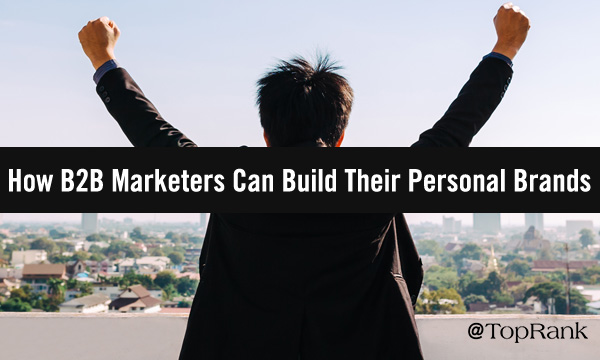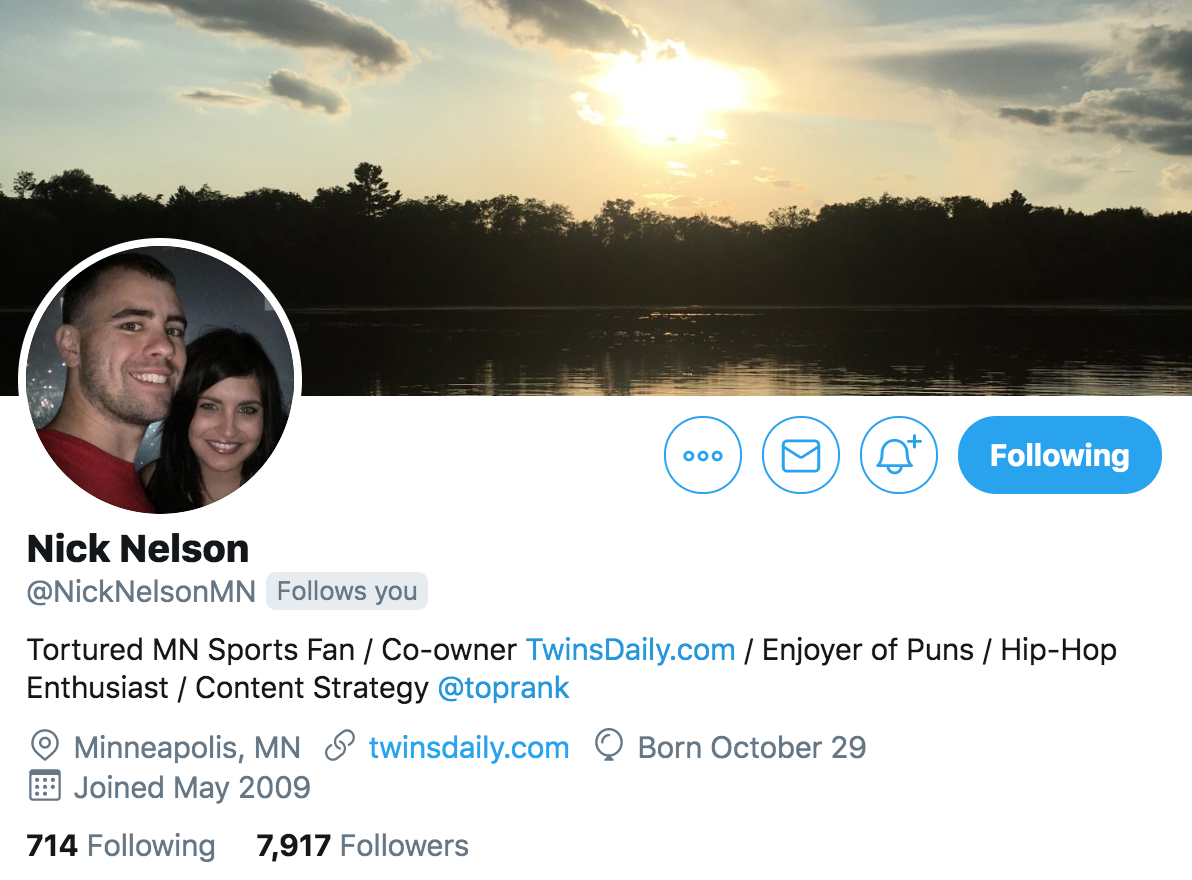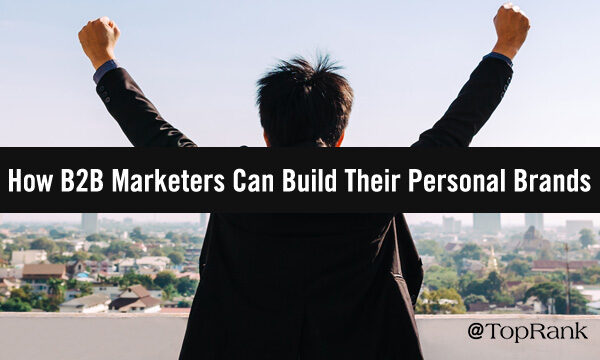
For some marketers, it’s second nature. For others, it’s uncomfortable territory. But no matter your predisposition, there’s no denying that personal brand-building is an essential skill in today’s B2B marketing environment.
It’s also fun! Cultivating your social media brand offers an opportunity to tie your own interests, passions, and perspectives into your professional identity.
Let’s explore why this is such an important focus for modern marketing practitioners, how to get it right, and how business leaders can encourage it.
Why Your Personal Brand on Social Media Matters as a Marketer
The list could go on endlessly, but at a high level, the rationale for personal brand-building on social media boils down to three key factors.
#1 – Customers connect with other people more than companies.
As much as we B2B marketers might like to believe otherwise, buyers aren’t drawn to brands. If a rapport is developed, it’s because of the people who represent those companies and build genuine human relationships.
An engaging and relatable personal brand creates a conduit for inbound interest. You don’t need to be overtly promotional. Simply talking about your industry — sharing your views and opinions — can prompt people to reach out and learn more, or to click through to your company’s pages out of interest. These are subtle triggers that generate awareness in an authentic way.
An engaging and relatable personal brand creates a conduit for inbound interest for your business. @NickNelson #B2BMarketing #B2BSocialMedia #Branding Share on X#2 – Personal profiles get more organic reach than brand pages.
This is true of virtually all social networks. The underlying motivation of any social media company is to keep users on their sites, engaging with others. Because of the dynamic we just mentioned — humans are more drawn to other humans than faceless brands — these networks are apt to elevate content from personal accounts over organizational ones. If you’ve ever done any social media marketing, you’ve likely noticed how difficult it is to grow the reach of company content on platforms like Facebook and LinkedIn without paying to amplify it.
Personal profiles offer a workaround. Creating content that aligns with your company’s narrative — or even simply re-sharing posts from the brand page via your own profile — increases the visibility of this content. Not only that, but it puts a real face on the source of the information. Here’s a simple example from our own Lane Ellis.

#3 – Your career growth and success might depend on it.
Yes, growing your personal brand on social media can help your company. But more than anything, it’s a valuable focus for you. When someone wants to research you online, they are very likely to check out your social accounts first and foremost. The researcher could be a customer, who will be impressed by an active and knowledgeable presence, but also a potential employer, for whom the same will be true.
Not only does an investment in growing your personal brand yield benefits for your marketability, but also for your professional network and even your capabilities. Through this undertaking, you’re bound to learn things you can apply in your job — even if the primary themes of your personal brand don’t exactly align with what your company does (more on that shortly).
How to Effectively Build Your Personal Brand on Social Media
It’s a paradox: many B2B marketers are incredibly gifted at portraying and promoting the brands they represent, but entirely uncomfortable or unfamiliar with doing the same for themselves. If that’s you, here are some tips to strengthen your results.
Find Your Rhythm
Being active on social media doesn’t mean you need to post something every hour, or even every day. It’s about finding a consistent routine that works for you and your followers. To more efficiently post content on multiple networks, or schedule batches of posts at once, take advantage of a tool like Hootsuite, Sprout, or Buffer.
You Don’t Have to Talk About the Same Things Your Company Does
This is a misconception that seems to hold people back. Maybe you’re not all that personally interested in what your company does, or you drain yourself by talking about it all day at work. One idea is to find a particular angle of your business or industry that strikes a chord with you, and will resonate with others. For instance, if you work in the finance industry, you could make data privacy your main area of exploration.
Or, you could choose to build your personal brand around something that doesn’t overlap with your company and its services. There’s benefit in growing your own audience and engagement even if it’s not the exact same audience your company serves.
As one example, take my story. I started blogging about baseball long before I was an agency marketer. In 2012 I teamed up with three others to create a website called Twins Daily. My Twitter presence is mostly oriented around baseball and that community. But through this experience I’ve learned many things that make me a better marketer. I’ve broadened my platform and reach. And I’ve grown my personal network, connecting with plenty of other marketers, creatives, and brand folks who also happen to be baseball fans.

Find your distinct passion and connect it to your professional identity. Just make sure the passion comes first.
Create a Balanced Approach
Maintaining a steady pipeline of interesting stories and commentary to share on your personal account is easier said than done. When it comes to refining your social media mix, SAP’s* Head of Global Influencer Marketing Ursula Ringham shared some sage wisdom with our Caitlin Burgess in her Digital Marketing Spotlight interview. Ursula situates her social output around her “five truths”:
- My work
- My family
- My passion
- Sports
- Third-party voices
This is a good framework. Define a similar mix that aligns with your passion/professional sweet spot, and use these truths as pillars for your content strategy.
The bottom line here is: Be authentic. Be yourself (or your brand). But be strategic. — @ursularingham Share on XStand Out and Be Fascinating
“Don’t underrate your ability to fascinate,” urged NYT best-selling author Sally Hogshead in her interview with Lee Odden on personal branding for marketers back in 2015. “In a sense, most of us were schooled to avoid being too fascinating. As kindergartners we’re taught to stand in line for class. Color within the lines. Raise a hand. Wait your turn. Standing out is labeled as misbehaving.”
You will not win by being invisible. Today, you win by being seen and remembered. Stand out, or don’t bother. — @SallyHogshead Share on XSally’s insights are just as relevant today. Just as companies need to differentiate themselves and rise above the saturated market, you’ll want to do the same with your personal brand in a social media world populated by billions of other people. Use your marketing brain to understand what will get noticed and drive engagement — catchy headlines, provocative angles, trendy topics, bold imagery, etc.
How B2B Companies Can Support Personal Brand-Building from Employees
If you’re a CMO or another business leader who sees the value in personal brand-building for employees, but you’re struggling to promote the practice within your ranks, here are a few ideas to get things moving.
- Implement an Employee Advocacy Program: Whether using a dedicated platform (LinkedIn Elevate* is among the most popular) or a more informal system run by people within your company, an employee advocacy program generates a pipeline of brand-approved content or articles that people in your company can easily access and share through their own networks. This is helpful because it removes the common reluctance among employees about getting in trouble for sharing or saying the wrong things. It can also make it easier for non-marketers to get on board.
- Lead by Example: When executives use their personal networks to dispense thought leadership and speak on behalf of the brand, it’s powerful. And when employees see this behavior, it can provide them with encouragement and a model to follow.
- Make It Inviting and Natural: The problem with many corporate-driven advocacy initiatives? “It’s so nakedly promotional, it’s like a commercial,” Jay Baer opines in a B2B Spotlight interview on the convergence of customer experience and employee advocacy. “Nobody’s gonna put that on their personal social media. They’re trying to turn employees into shills and nobody’s down with that.” For guidance on steering clear of this pitfall, I highly recommend watching the portion of Jay and Lee’s conversation that starts around the 9-minute mark in this video:
To learn more about personal brand-building and how it can align with a company’s marketing goals, check out Caitlin’s post on How Employee Engagement Helps Drive the Success of Your Marketing Efforts.
*Disclosure: LinkedIn and SAP are TopRank Marketing clients.



